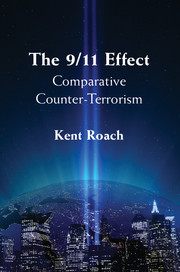Book contents
- Frontmatter
- Brief Contents
- Contents
- Acknowledgments
- 1 Introduction
- 2 The United Nations Responds: Security Council Listing and Legislation
- 3 Countries That Did Not Immediately Respond
- 4 The United States Responds: Executive Power and Extra-Legalism
- 5 The United Kingdom Responds: A Legislative War on Terrorism
- 6 Australia Responds: Hyper-Legislation
- 7 Canada Responds: Border and Human Security
- 8 Conclusions
- Index
- References
8 - Conclusions
Published online by Cambridge University Press: 05 June 2012
- Frontmatter
- Brief Contents
- Contents
- Acknowledgments
- 1 Introduction
- 2 The United Nations Responds: Security Council Listing and Legislation
- 3 Countries That Did Not Immediately Respond
- 4 The United States Responds: Executive Power and Extra-Legalism
- 5 The United Kingdom Responds: A Legislative War on Terrorism
- 6 Australia Responds: Hyper-Legislation
- 7 Canada Responds: Border and Human Security
- 8 Conclusions
- Index
- References
Summary
After examining the responses to terrorism of six countries, David Charters concluded in 1994 that countries were more likely to threaten their democratic character when responding to domestic as opposed to international terrorism. As Martha Crenshaw has observed, “since the American declaration of a war on terror, however, that argument that internal terrorism is most provocative can certainly no longer be sustained.” As seen in Chapter 2, the globalization of terrorism has meant that the United Nations (UN), and particularly its Security Council, has assumed a much greater role in counter-terrorism policy. Although this process started before 9/11, it has accelerated greatly since that time. The Security Council has acted as a global legislator in Resolutions 1267, 1373, and 1540 and as a global executive in compiling secret lists of those associated with the Taliban and al Qaeda. It has, however, failed to provide basics for legislative combat of terrorism such as a clear definition of terrorism or processes that afford a right to fair hearings and a judicial remedy.
Information
- Type
- Chapter
- Information
- The 9/11 EffectComparative Counter-Terrorism, pp. 426 - 462Publisher: Cambridge University PressPrint publication year: 2011
